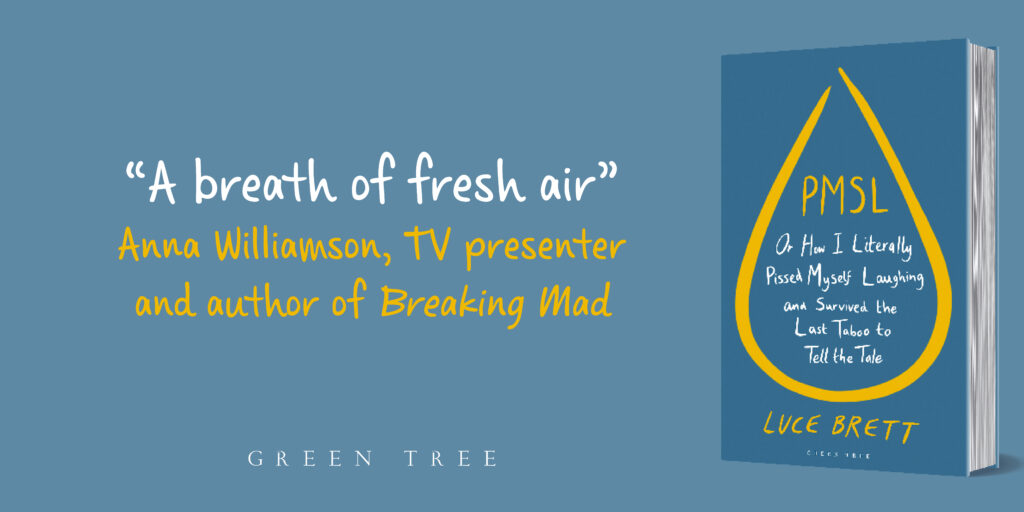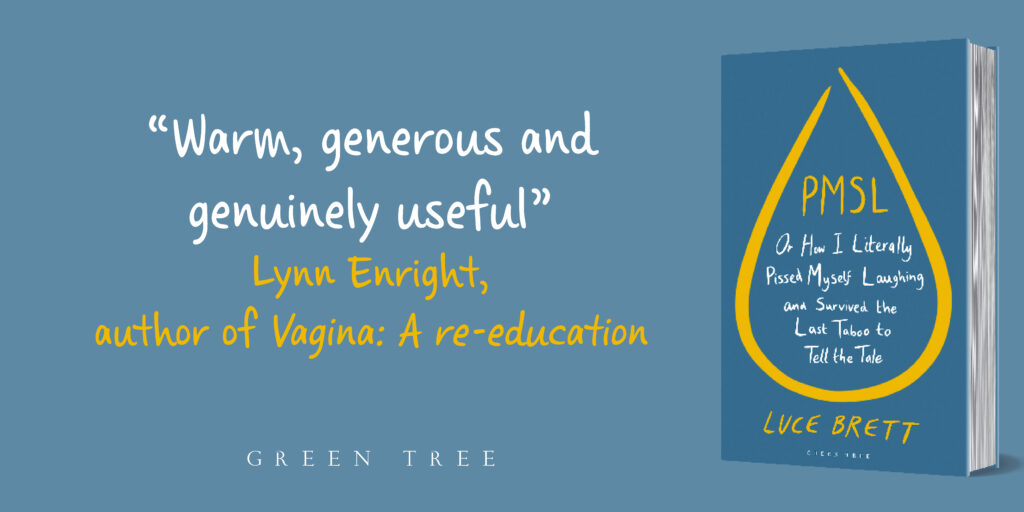You can buy my first nonfiction book – PMSL Or How I Literally Pissed Myself Laughing and Survived the Last Taboo to Tell the Tale at all the usual places. Reviews are super important so do please leave one if you liked it.
You can order it from any local independent bookshop, on twitter or direct from the publisher Bloomsbury.
If you order via The All Good Bookshop they can organise a signed copy! I really hope you enjoy it and do get in touch on twitter or instagram if you enjoyed PMSL and would like to work together or just chat. Luce x

PMSL is a feminist roar, part health book, mostly memoir, taking you to the heart of the taboo around incontinence, its affects on your mind, body, social life, sense of humour and your soul. It strives to speak the unspeakable, overturn years of stigma and taboo, facing down the myths and innacuracies and inequalities which surround continence issues, including their treatment and care.
Despite the taboo, actually women do laugh and joke and know about incontinence and confide minor mishaps if they are all together, like joking about weeing themselves laughing or on a run. But when I blogged about the more serious aspects of it, women I had never met would write to me about their intimate life and how hard it was for them. Some had never told anyone. If lots of people suffer with this, in silence, not even getting help when there’s loads of it out there, that’s heartbreaking.

Also for me it’s a feminist issue. It affects women more than men, and it is part of a wider problem of women’s bodies not getting the proper attention they deserve.
And ultimately I was more furious and indignant than I was ashamed. Incontinence doesn’t just affect women who’ve had babies – there are millions of women it touches. I didn’t want other people to put up with this crap, feel depressed and wretched, stare at leaflets about anatomy that didn’t feel like they were talking about real life at all. And I didn’t want them to feel as lonely as I did.

It tells my story, looking through a patient’s eye – with forensic and sometimes brutal detail – at procedures, treatments and the effect of wandering around with wet knickers for a decade, but it also looks further – at health care, where innovation and research have been stymied by the same stigma issues which silence patients and stop them getting help, at politics, at our attitudes and humour around our private parts, at our education, and at childbirth, and how what we know about that isn’t always adequate to help us prepare for the realities and potential damage or impact on our lives. It also faces down some of the biggest and most devestating medical taboos too – like poo incontinence, sex and incontinence, and the impact of incontinence, birth injury and trauma on mental health.
It has a self-help guide at the back, with numbers and information from medical experts, and even offers ways to think about how you might get help if any of the same issues affect you or someone you love. I hope you enjoy it.
For any press or publicity enquiries please contact the team at Bloomsbury direct, or on twitter (@lucebrett) of via my content form here.
You can order it at your local bookshop, on twitter or online direct from the publisher Bloomsbury.
What if you are that woman?
This website isn’t a self-help guide, and I have no medical training. If you are having trouble with incontinence or depression the good news is however hard it might feel there are absolutely loads of places you can go to get easy help and good advice. LOADS.
For broken bodies especially your private parts
For incontinence the most obvious first port of call is your GP or GP Practice Nurse, they will know exactly what services are available to you. If you find it hard to know what to say to them there are plenty of approaches.
I went for a bald statement, and occasionally choice language, but you are likely far more polite. The key is you don’t need to be embarrassed, but even if you are you can find ways to get the conversation started.
Doctors know not everyone walks around using words like urethra or bladder or bowels or prolapse. And they are very likely to know exactly what you mean if you say you are leaking, wetting yourself, or having accidents, and to know how to ask the right questions to work out exactly what is going wrong and what help you need.
Doctors can also cope if you write down what is wrong and give it to them.
If you want to find more about your symptoms, someone else’s symptoms or incontinence generally, there is a wealth of information available online from helplines with physiotherapists and other experts, to chat rooms and forums which can offer some comfort, solace in speaking to other wet-knicker-warriors and continence patients and survivors, and support in times of trouble.
Here are some I found particularly useful, some use different approaches, some are related to famous brands, I don’t endorse any and am not paid to promote anyone.
https://www.nhs.uk/Livewell/incontinence/Pages/Gettinghelp.aspx – Brilliant clear information from the UK’s National Health Service, including videos on continence and what help is available
http://www.gussetgrippers.co.uk/ – excellent resources from a physiotherapist turned stand-up Elaine, who is saving the world one fanjo at a time starting with this website designed to answer lots of difficult questions people have but are often too afraid to ask
http://www.bladderandboweluk.co.uk/ – An excellent charity with a wealth of straight talking, easy to understand and helpful resources, stories from others with a wealth of conditions, and a free helpline
http://www.tena.co.uk/tenalady/ – advice and resources from pad manufacturers Tena, and the option to buy their products direct if you can’t face the supermarket aisle of shame or if you are unable to leave the house easily and would find delivery helped that.
https://www.alwaysdiscreet.co.uk/en-gb – website and product information from Always about their Discreet ranges including pants and pads. Again information, people’s real experience, videos and information about leaking
https://www.kegel8.co.uk/ Website for electronic pelvic floor exercising devices, but which also contains a wealth of information and an informative blog with a whole host of embarrassing and upsetting issues discussed frankly and clearly. Set up by a remarkable woman who put her own experiences to excellent use helping develop tools for others.
If you have a website or resource which you think would be useful for anyone, especially but not only women, who has incontinence issues do feel free to email me and let me know, so I can check out your site and add your link to this page.
For broken minds, your other private parts, which also deserve care and attention
In addition I write and have written a great deal about the effects on my mind of a traumatic birth and difficult physical condition. Like incontinence it can feel very, very hard to go and ask for help or explain how you are feeling, but there is a great deal that can be done from medication to other therapies, through the NHS and privately. You GP, midwife or health visitor is an excellent place to start to find out what help you can get and how to start working towards recovery.
During those times I found the following sources very helpful
The Samaritans offer a wealth of services to listen to you if you are feeling really down, or even suicidal They are extremely helpful, kind and experienced and can make a real difference even if you feel that no one could possibly help or understand. You can email jo@samartians.org or ring 116 123 (UK) or 116 123 (ROI). You can also visit your local Samaritans branch (easy to google or find on their site) or write to them at: Freepost RSRB-KKBY-CYJK, PO Box 9090, STIRLING, FK8 2SA
The Samaritans are open 24 hours a day, 365 days a year. If you need them right now it is best to dial 116 123. The call is FREE. You don’t have to be suicidal to call them.
https://www.nhs.uk/livewell/mentalhealth/ The NHS Living Well site has lots of information about mental health, and how you can access the right services for you. The website is easy to access.
https://www.mind.org.uk/ An excellent charity who were also very helpful and allowed me to contribute to some of their policy work.
If you have a website or resource which you think would be useful for anyone, suffering from depression, pnd, and or any other mental illness do feel free to email me and let me know so I can add your link to this page.